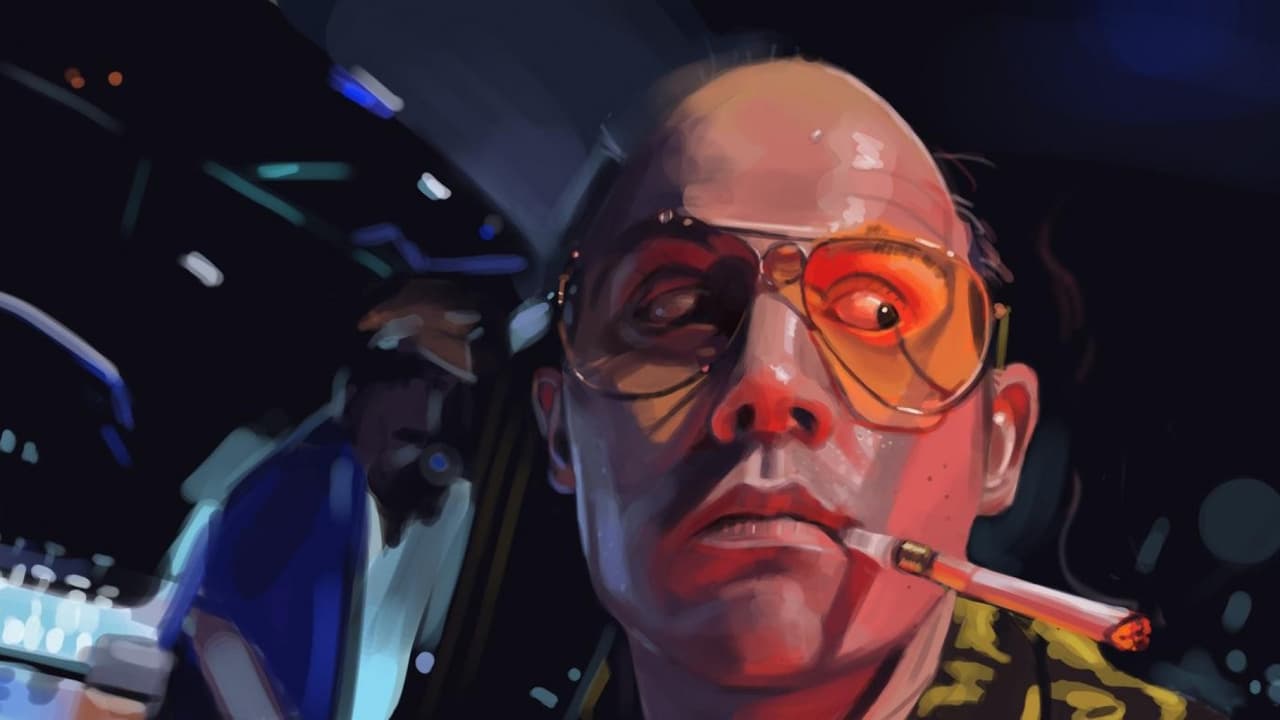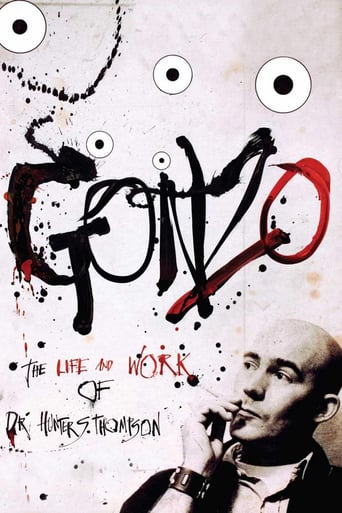

Can you just imagine if there was another Hunter S. Thompson twin with the equivalent eccentricities as Gonzo himself? That would be pretty scary, because one Gonzo is all we needed. Love him, hate him, or unsure sometimes on how to judge him (as yours truly) there will never be another Dr. Hunter S. Thompson. Renowned documentary filmmaker Alex Gibney gets the write stuff on depicting Thompson's roller-coaster life in the doc "Gonzo: The Life & Work of Dr. Hunter S. Thompson". I was perplexed on how much Hunter footage Gibney was able to hunt down, and on the diverse group of popular people who were willing to be interviewed for the doc. For those of you who lived under caves in the 60's or 70's or who were not embryos yet, Dr. Hunter S. Thompson was a no-holds barred journalist whose inclusive, illustrative, and candid writing style became a revolutionary literary art form entitled Gonzo. Thompson's human brand was of liquor, hallucinogens, guns, cigarette holders, sunglasses, zany hats, and fast gab. While his writing brand consisted of political conservative bashing, American dream searching surreal trips, and ruckus to the stable establishment. His infamous literary themes were the Hell's Angels adventures, the 1972 Presidential Election, and the Fear & Loathing series. Hunter was an adjunct reporter for Rolling Stones magazine and his most successful books were "The Rum Diaries" and "Fear and Loathing in Las Vegas". The documentary discloses all of the aforementioned with revealing footage of his distinct life & work. Not to mention (I think I did mention) edifying interviews with those who loved, tolerated, or despised him including: Nixon speechwriter Pat Buchanan, rocker Jimmy Buffet, former Presidential candidates Gary Hart & George McGovern, Hells Angels' leader Sonny Barger, Hunter's first wife Sandi Wright, second wife Anita Thompson, son Juan, and a roundabout of others. Thompson was his own contradictive existence as he sporadically despised some of the same behaviors he would interject himself in. And Gibney successfully articulates that theme in some of the film's disclosures. Hunter sadly committed suicide in 2005 by a self-inflicted gunshot to the head. It was in his disposition that is the way he wanted to leave Planet Earth, but somehow is still shocked many it would actually happen, present company included. The only aspect of Hunter's existence that still baffled me, and was not presented in the doc, is how this guy was able to avoid hangovers. Maybe he had some Hemingwayism in him, but Hunter was an everyday Wild Turkey man, and maybe that long term abuse was an adrenaline rush; but there is still something called Hangovers that causes all humanoids to eradicate their cerebral function. It did not seem to affect Thompson's diverse knowledge & memory. Maybe Hunter was one of a kind. I doubt it. Maybe if Gibney had researched this Hunter phenomenon, we would now why he was not Gonzo many times due to his massive drinking. Nevertheless, "Gonzo: The Life & Times of Dr. Hunter S. Thompson" is a cinematic documentary journey that is worthy enough to buy the ticket and take the ride. Therefore, no need to fear and loathe seeing this Gonzo bio doc. **** Good
... View MoreGonzo: The Life and Work of Dr Hunter S. Thompson is a very well put together documentary from Alex Gibney, whose Enron: the Smartest Guys in the Room was a fascinating insight into the fluff and fraud of a section of Corporate America in the early years of the 21st century. Not sure how I managed to miss Gibney's Who Killed the Electric Car? but I intend to track it down now, as on the evidence of this movie, it will be worth the effort. Gibney frames his subject well, with a wealth of background detail on the 60s West Coast counter culture which launched Thompson's literary career, and he has assembled a great soundtrack; it's almost worth watching this movie just to hear the music. Gibney follows Thompson's story coherently. He tracked down some revealing home movies and some unexpected people (Pat Buchanan, Jimmy Carter) to explain Hunter S Thompson to the world, (his first wife seems remarkably lacking in angst despite having to call the sheriff when she feared for her safety), although I felt there could have been a little more emphasis on the early years (the air force, the time in Puerto Rico and Brazil). There is some suggestion that Thompson carried a fairly major chip on his shoulder from his teen years, when his father died, leaving his mother to raise 3 sons in genteel near-poverty. Hunter, with his sharp intellect, mixed with the rich kids but was in actuality a fairly poor kid, and one incident when he was jailed for his proximity to a crime, may have contributed to his life long despising of authority.I'm slightly too young to have been a fan of his writing back in the late 60s and early 70s, when I was a teenager living on another continent, and although I've caught up with some of it since, the movie of Fear and Loathing in Las Vegas, which I re-watched recently, produces little reaction from me these days beyond a yawn. It's better on the page. But he was a fascinating character, no doubt about it, and I can't think of anyone around today who can write with quite his accuracy and style (and how we need it.) My husband confessed that he had never heard of Thompson (well we are foreigners!) before watching this movie, so it may well be an indication of how good a documentary this is, that we both enjoyed it so much.Gonzo tracks the journey of Thompson from outsider journalist and acute spectator, whose acid sharp observations skewered the Great American Dream, to the sad situation where Thompson himself became the story, stoned, drunk and wasting his talents, apparently feeling a need to live up to the over-the-top persona he had created on the page. On an objective level, it's intriguing to watch the winding path from the great and original writing of Fear and Loathing in Las Vegas, Hells Angels and the 1972 presidential election - where he championed the decent McGovern - to the debacle in Zaire, the Ali Forman match-up, where Thompson gave away his tickets and spent the time drunk in the hotel pool, thereby missing one of the greatest boxing matches of all time, (and failing to report on the fight for the mugs who had paid his expenses.)Much as I admire his well pointed vitriol and satire and wish we had it around today - I have a very limited amount of sympathy for people who choose self destruction as a life style, and Thompson always seemed to blow it just as true greatness beckoned. He comes across as utterly self obsessed and I found myself lacking any real sympathy for him, or connection to him, rather feeling impatient that he chose not to hang around long enough and stay sober often enough, to wield his pen a few years longer. Everyone, of course, is free to chose their own path to death, and Thompson's makes interesting viewing. Just don't ask me to feel much sympathy for the guy. Still, it's a good movie.
... View MoreExcept for some criticism of Thompson by his first wife and a jovial Pat Buchanan, I think the film went too easy on Hunter, e.g, pretty much laughed off the dirty trick he played on Muskie. I also disagree with the observation by some people in the movie (and at least one commenter here)about how tragic he took his own life because we need him now more than ever. The blogosphere had already made Thompson pretty irrelevant. There are thousands of pundits (drug-using and otherwise)covering the political scene in a gonzo way to counter the pack journalism Tim Crouse inveighed against in The Boys on the Bus, which may explain Thompson's waning popularity in the years leading up to his death. Another interesting thing about the film was the contrast between the real Thompson, as shown in copious footage and Johnny Depp's portrayal of him, as shown in clips from Fear and Loathing in Las Vegas. The juxtaposition revealed Depp to be wide of the mark in capturing Thompson's essence, which was far more "sober" than what would gather from Depp's cartoonish characterization of him. Such over-the-top performances appear to be Depp's stock in trade, a convenient cover, IMHO, for his limited acting ability. I'd like to see him pull off a performance closer to reality, but I'm not holding my breath. (Even the gratuitous use of Depp to read passages from Hunters' books revealed him to be the most affected person in this movie.) Anyway, I came away from this film with both more and less respect for Thompson, so maybe there was more balance there than I'm giving credit for. And as a time-travel piece back to the days of the culture wars, it's very effective.
... View MoreThis is an absorbing doc not only of the good doc but the whole counterculture that he championed in many ways. For all his excessive lifestyle that became almost a parody of the drug culture, he remained a true intellectual and anti-corruption/hypocrisy crusader. He embraced the vision of a new world not ruled by greed and war-mongering, and as early as 1971 proclaimed his great sadness that the movement and the moment of flower power had passed and with it the chance for sane politics. This moment was captured well in "Where the Buffalo Roam" starring Bill Murray as HST, which is given kind of short shrift in this documentary in favor of scenes from "Fear and Loathing Las Vegas" with Johnny Depp as HST. Considering that Depp produced and narrates the film as well as financed the grandiose send-off that Thompson envisioned for himself, it's not strange that Murray's portrayal would be downplayed, as excellent as it was (and Peter Boyle's as the Samoan lawyer.) All in all, it is a well-balanced account of Thompson's life and work, with many pertinent interviewees like his two wives and son, Jann Wenner of Rolling Stone, Sonny Barger of the Hell's Angels, Jimmy Buffett, George McGovern, Jimmy Carter, Pat Buchanan, Tom Wolfe, and various Aspenites. His passion and wit were undeniable, and his addiction to guns, booze and dope were in many ways forgivable. But his absence in today's disastrous political scene, his voice against war and corruption is sorely missed, and lamented by several of the interviewees. The parallels between Nixon and Bush are easily drawn, and "Gonzo" does this without hammering the point home except to exhort the audience to take up the fight that the Good Doctor waged in a seemingly crazy, but noble and honorable way for most of his life.
... View More